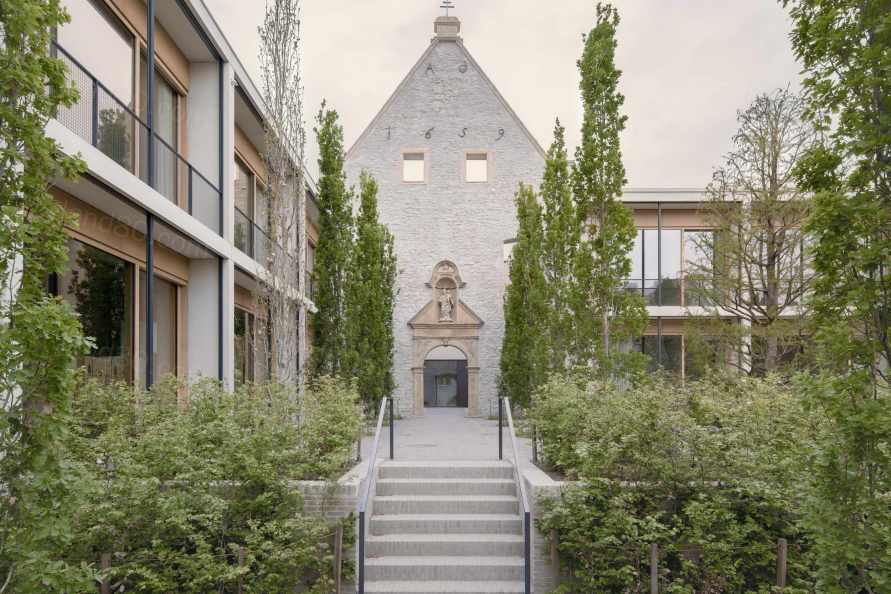前"圣文森茨医院"位于帕德博恩中世纪的市中心,紧邻帕德泉的西部支流。医院于2013年迁出,现有的建筑群已被改造成一家家族企业的新总部,由David Chipperfield建筑事务所设计。
The former ‘St. Vincenz hospital’ is
situated in the medieval town centre of Paderborn next to the western tributary
of the Pader Springs. The hospital moved out in 2013 and the existing complex
has been converted into a new headquarter for a family-run company designed by
David Chipperfield Architects Berlin.

现有的建筑源于一座前十七世纪的卡普钦修道院。这些建筑从1841年起被用作医院,在第二次世界大战期间遭到严重破坏。随后,该建筑群通过重建和后来的改造,经历了几次变化和扩建。雅各比工作室的改建涉及拆除战后的增建物,使修道院的历史建筑结构再次暴露出来。特别是教堂立面、回廊、东楼翼和十七世纪的地窖都得到了保留和修复,形成了一个以原回廊为核心的采石砖石砌筑的风景如画的废墟结构。修道院和附属建筑群嵌入了由Wirtz设计的花园。
The existing ensemble originates from a
former seventeenth century Capuchin monastery. The buildings, which were used
as a hospital from 1841 onwards, were severely damaged during the Second World
War. Subsequently, the complex underwent several changes and extensions through
reconstruction and later modifications. The conversion for the Jacoby Studios
involved the removal of the post-war additions, exposing the historic building
fabric of the monastery once again. In particular, the chapel façade, the
cloister, the east building wing and the seventeenth century cellar were
preserved and restored, creating a picturesque ruin structure made of
quarry-stone masonry with the former cloister at its heart. The complex of
monastery and annexes is embedded into a garden designed by Wirtz
International.

根据与原始建筑的北,西和南的正交结构,扩展了新的建筑,从两层到三层不等。通过历史悠久的入口大门和前礼拜堂,游客可以进入入口大厅。
New extension wings, ranging from two to
three-storeys, are arranged in accordance with the orthogonal structure to the
north, west and south of the original buildings. Through the historic entrance
gate and the former chapel, visitors access the entrance foyer.

与历史情境相呼应,这个合奏再次以不同体积的均衡组成再次出现在城市景观中。在帕德斯普林斯(Pader Springs)的城市景观中,新建筑群具有自己的认同感,同时保持了历史的连续性
Echoing the historic situation, the
ensemble appears once again in the cityscape as a well-balanced composition of
different volumes. In the urban landscape of the Pader Springs, the new complex
has its own sense of identity, while maintaining historic continuity

Project start: 2014
Construction start: 2017
Completion: 2020
Gross floor area: 12,500 m2
Client: Jacoby GbR represented by Ellen
Jacoby, Franz Jacoby, Yvonne Jacoby
Architect: David Chipperfield Architects
Berlin
Partners: David Chipperfield, Martin
Reichert, Alexander Schwarz (Design lead)
Project architects: Franziska Rusch
(Concept study), Frithjof Kahl (Preparation and brief to Developed Design,
Design intent details, Site design supervision)
Project team: Thomas Benk, Thea Cheret,
Dirk Gschwind, Elsa Pandozi, Franziska Rusch, Diana Schaffrannek, Eva-Maria
Stadelmann, Amelie Wegner; Graphics, Visualisation: Dalia Liksaite In
collaboration with
Construction documentation: Schilling
Architekten, Cologne,
Executive architect: Jochem Vieren (Project
management), Michael Zinnkann (Construction management)
Landscape architect: Wirtz International
nv, Schoten, Peter Wirtz, Jan Grauwels
Structural engineer: Gantert + Wiemeler
Ingenieurplanung, Münster
Services engineer: Köster Planung GmbH,
Münster
Building physics, Acoustics: Hansen
Ingenieure, Münster
Fire consultant HHP West Beratende
Ingenieure GmbH, Bielefeld |